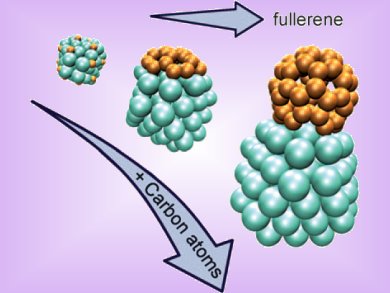C60 fullerenes have potential applications in molecular electronics and non-linear optical devices. Current synthesis methods of fullerenes are generally low yielding: Vaporization methods and generation from polyarene precursors give yields below 1 %.
Francesc Viñes and Andreas Görling, University of Erlangen-Nuremberg, Germany, examined if fullerenes can be synthesized from simple and abundant precursors with the help of templates.
They used ab initio calculations to show that simple fullerenes like C60 could be built from methane and ethylene with a supported Pt nanoparticle with exposed (111) face. The Pt nanoparticle acts as both template and dehydrogenation catalyst. Methane and ethylene were shown to pre-assemble on the nanoparticle surface and were sequentially incorporated into the fullerene structure. Fullerene fomation was shown to be thermodynamically more favored than that of graphene sheets, which limited the graphene growth so that C60 was formed.
The versatility of Pt nanoparticles leads the authors to believe that the tailor-made synthesis of fullerene-like structures such as heterofullerenes may also be possible.
- Template-Assisted Formation of Fullerenes from Short-Chain Hydrocarbons by Supported Platinum Nanoparticles
F. Viñes, A. Görling,
Angew. Chem. Int. Ed. 2011.
DOI: 10.1002/anie.201006588




